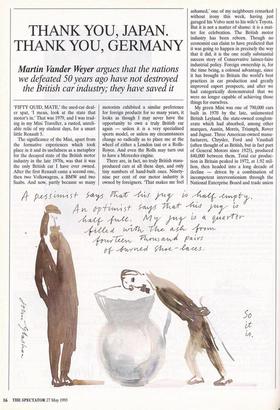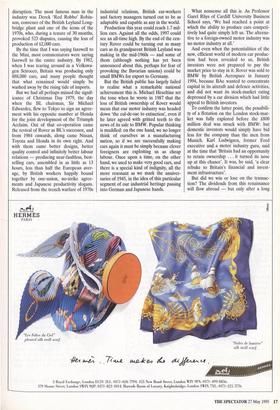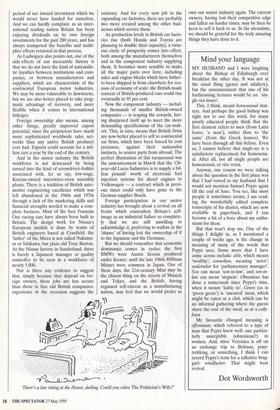THANK YOU, JAPAN.
THANK YOU, GERMANY
Martin Vander Weyer argues that the nations
we defeated 50 years ago have not destroyed the British car industry; they have saved it
`FIFTY QUID, MATE,' the used-car deal- er spat, 'I mean, look at the state that motor's in.' That was 1979, and I was trad- ing in my Mini Traveller, a rusted, unreli- able relic of my student days, for a smart little Renault 5.
The significance of the Mini, apart from the formative experiences which took place in it and its usefulness as a metaphor for the decayed state of the British motor industry in the late 1970s, was that it was the only British car I have ever owned. After the first Renault came a second one, then two Volkswagens, a BMW and two Saabs. And now, partly because so many motorists exhibited a similar preference for foreign products for so many years, it looks as though I may never have the opportunity to own a truly British car again — unless it is a very specialised sports model, or unless my circumstances change so radically as to place me at the wheel of either a London taxi or a Rolls- Royce. And even the Rolls may turn out to have a Mercedes engine.
There are, in fact, no truly British mass- produced cars at all these days, and only tiny numbers of hand-built ones. Ninety- nine per cent of our motor industry is owned by foreigners. 'That makes me feel ashamed,' one of my neighbours remarked without irony this week, having just garaged his Volvo next to his wife's Toyota. But it is not a matter of shame: it is a mat- ter for celebration. The British motor industry has been reborn. Though no economist can claim to have predicted that it was going to happen in precisely the way that it did, it is the one really substantial success story of Conservative laissez-faire industrial policy. Foreign ownership is, for the time being, a colossal advantage, since it has brought to Britain the world's best practices in car production and greatly improved export prospects, and after we had categorically demonstrated that we were no longer capable of achieving those things for ourselves.
My green Mini was one of 790,000 cars built in 1970 by the late, unlamented British Leyland, the state-owned conglom- erate which had absorbed, among other marques, Austin, Morris, Triumph, Rover and Jaguar. Three American-owned manu- facturers, Chrysler, Ford and Vauxhall (often thought of as British, but in fact part of General Motors since 1925), produced 840,000 between them. Total car produc- tion in Britain peaked in 1972, at 1.92 mil- lion, then headed into a long decade of decline — driven by a combination of incompetent interventionism through the National Enterprise Board and trade union disruption. The most famous man in the industry was Derek 'Red Robbo' Robin- son, convener of the British Leyland Long- bridge plant and one of the icons of the 1970s, who, during a tenure of 30 months, provoked 523 disputes, causing the loss of production of 62,000 cars.
By the time that I was saying farewell to the Mini, most commentators were saying farewell to the entire industry. By 1982, when I was tearing around in a Volkswa- gen Scirocco, Britain was producing only 888,000 cars, and many people thought that what remained would simply be washed away by the rising tide of imports.
But we had all perhaps missed the signif- icance of Christmas Day 1979, the day when the BL chairman, Sir Michael Edwardes, flew to Tokyo to sign an agree- ment with his opposite number at Honda for the joint development of the Triumph Acclaim. Out of that co-operation came the revival of Rover as BL's successor, and from 1984 onwards, along came Nissan, Toyota and Honda in its own right. And with them came better designs, better quality control and infinitely better labour relations — producing near-faultless, best- selling cars, assembled in as little as 13 hours, less than half the European aver- age, by British workers happily bound together by one-union, no-strike agree- ments and Japanese productivity slogans. Released from the trench warfare of 1970s industrial relations, British car-workers and factory managers turned out to be as adaptable and capable as any in the world.
Production this year could reach 1.7 mil- lion cars. Against all the odds, 1997 could see an all-time high. By the end of the cen- tury Rover could be turning out as many cars as its grandparent British Leyland was making in the mid-1960s — and some of them (although nothing has yet been announced about this, perhaps for fear of provoking the Bavarian unions) could be small BMWs for export to Germany.
But the British public has largely failed to realise what a remarkable national achievement this is. Michael Heseltine set the tone when he wrote in 1987 that the loss of British ownership of Rover would mean that our motor industry was headed down 'the cul-de-sac to extinction', even if he later agreed with gritted teeth to the news of its sale to BMW. Popular thinking is muddled: on the one hand, we no longer think of ourselves as a manufacturing nation, so if we are successfully making cars again it must be simply because clever foreigners are exploiting us as cheap labour. Once upon a time, on the other hand, we used to make very good cars, and there is a special kind of indignity, all the more resonant as we mark the anniver- saries of 1945, in the idea of this particular segment of our industrial heritage passing into German and Japanese hands. What nonsense all this is. As Professor Garel Rhys of Cardiff University Business School says, 'We had reached a point at which the ability to produce cars competi- tively had quite simply left us. The alterna- tive to a foreign-owned motor industry was no motor industry at all.'
And even when the potentialities of the new, efficient world of modern car produc- tion had been revealed to us, British investors were not prepared to pay the market price to stay in it. Rover was sold to BMW by British Aerospace in January 1994, because BAe wanted to concentrate capital in its aircraft and defence activities, and did not want its stock-market rating depressed by a car division which had little appeal to British investors.
To confirm the latter point, the possibili- ty of a flotation on the London stock-mar- ket was fully explored before the £800 million deal was struck with BMW: but domestic investors would simply have bid less for the company than the men from Munich. Karl Ludwigsen, former Ford executive ancl a motor industry guru, said at the time that 'Britain had an opportunity to retain ownership . . . it turned its nose up at this chance'. It was, he said, 'a clear rebuke to Britain's financial and invest- ment infrastructure'.
But did we win or lose on the transac- tion? The dividends from this renaissance will flow abroad — but only after a long period of net inward investment which we would never have funded for ourselves. And we can hardly complain: as an inter- national trading nation Britain has been enjoying dividends on its own foreign investments for the past 200 years, and has always trumpeted the benefits and multi- plier effects returned in that process.
As Ludwigsen also points out, one of the side-effects of our mercantile history is that we do not have the kind of nationalis- tic loyalties between institutions and com- panies, or between manufacturers and suppliers, which are characteristic of the continental European motor industries. We may be more vulnerable to downturns, but we are also better placed to take prag- matic advantage of recovery, and more flexible when it comes to international linkages.
Foreign ownership also means, among other things, greatly improved export potential, since the proprietors have much more sophisticated worldwide sales net- works than any native British producer ever had. Exports could account for a mil- lion cars a year by the end of the century.
And in the motor industry the British workforce is not demeaned by being turned into the kind of screwdriver-fodder associated with, let us say, low-wage, Korean-owned microwave-oven assembly plants. There is a tradition of British auto- motive engineering excellence which was left abandoned in the 1960s and 1970s through a lack of the marketing skills and financial strengths needed to make a com- plete business. Most of the best Formula One racing cars have always been built in Britain. The design work for Nissan's European models is done by teams of British engineers based at Cranfield: the `father' of the Micra is not called Nakamu- ra or Ishikawa, but plain old Tony Burton. At the Nissan factory in Sunderland, there is barely a Japanese manager or quality controller to be seen in a workforce of nearly 5,000.
Nor is there any evidence to suggest that, simply because they depend on for- eign owners, these jobs are less secure than those in fine old British companies: experience in the recession suggests the contrary. And for every new job in the expanding car factories, there are probably two more created among the other busi- nesses which service them.
As production levels in British car facto- ries rise (both Honda and Toyota are planning to double their capacity), a virtu- ous circle of prosperity comes into effect, both among the manufacturers themselves and in the component industry supplying them. It becomes more sensible to make all the major parts over here, including axles and engine blocks which have hither- to been shipped in from elsewhere for rea- sons of economy of scale: the British-made content of British-produced cars could rise eventually to 95 per cent.
Now the component industry — includ- ing thousands of smaller British-owned companies — is reaping the rewards, hav- ing sharpened itself up to meet the more demanding specifications of the car-mak- ers. This, in turn, means that British firms are now better placed to sell to continental car firms, which have been forced by cost pressures, against their nationalist instincts, to source parts from abroad. The perfect illustration of this turnaround was the announcement in March that the 126- year-old Lucas Industries is to supply a bil- lion pounds' worth of electronic fuel injection systems for diesel engines to Volkswagen — a contract which in previ- ous times could only have gone to the German supplier Bosch.
Foreign participation in our motor industry has brought about a revival on all fronts which contradicts Britain's self- image as an industrial failure so complete- ly that we are still unwilling to acknowledge it, preferring to wallow in the `shame' of having lost the ownership of it to the Japanese and the Germans.
But we should remember that economic dominance comes in cycles; the first BMWs were Austin Sevens produced under licence; until the late 1960s Hillman Minxes were common in Japan. One of these days, the 21st-century Mini may be the chicest thing on the streets of Munich and Tokyo, and the British, having regained self-esteem as a manufacturing nation, may feel that we would prefer to `There's a late sitting at the House, darling. Could you video The Politician's Wife?' own our motor industry again. The 'current owners, having lost their competitive edge and fallen on harder times, may by then be keen to sell it back to us. In the meantime, we should be grateful for the truly amazing things they have done to it.




































































 Previous page
Previous page